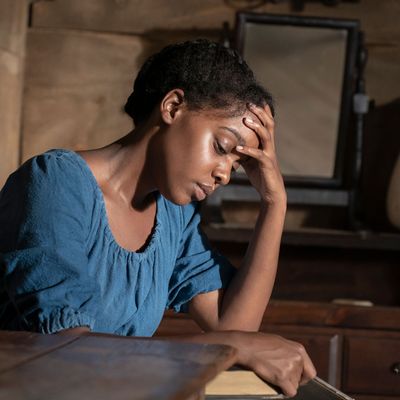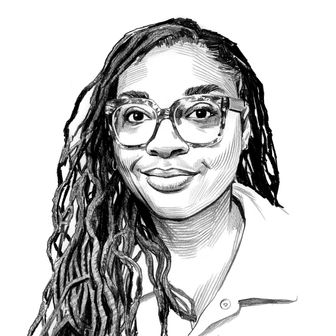
I’ve always related heavily to W.E.B Du Bois’s concept of double consciousness. In The Souls of Black Folk, he says, “It is a peculiar sensation, this double consciousness … one ever feels his two-ness, an American, a Negro; two souls, two thoughts, two un-reconciled strivings; two warring ideals in one dark body, whose dogged strength alone keeps it from being torn asunder.”
I’ve grappled with this feeling my whole life, but I take it a step further and say that I deal with triple consciousness. For lack of a better word, I was born “woke” when many people were still asleep. I’m the daughter of a radical. So when I first read Kindred, I felt validated. Octavia Butler not only demanded people see what I saw my whole life, but she also painted a picture so vivid you would think it’s a photograph.
People don’t come to consciousness through sanitized versions of our history that pander to white feelings so much it could be considered propaganda. Kindred pulls us out of that by our shoulders and vigorously shakes us until we can see clearly. The in-depth descriptions of slave life and torture are accompanied by the powerful themes represented within the time-traveling and Dana’s own thought process to create an end product that would leave anyone emotional. And I’m sitting here wondering, Where is all of this in the show?
A quote from Kindred that encompasses the book’s mission occurs when Dana witnesses her first whipping. Butler writes, “I had seen people beaten on television and in the movies. I had seen the too-red blood substitute streaked across their backs and heard their well-rehearsed screams. But I hadn’t lain nearby and smelled their sweat or heard them pleading and praying, shamed before their families and themselves. I was probably less prepared for the reality than the child crying not far from me.” Her writing forces us to grapple with slavery as a reality and not a cautionary tale of America’s past.
In the series, there haven’t been many vivid depictions of violence, only anecdotes told in passing. Remember Olivia saying when she first arrived on the plantation she saw a family being massacred and chopped into bits? Well, Dana didn’t ask any questions, and if you went to check a text on your phone, you might have missed it. I acknowledge not wanting to fall into the trauma-porn category, perhaps wanting to present the more psychological side, but the show still doesn’t push that boundary. There’s a scene where Dana eavesdrops on Tom threatening Luke, but the irony is not lost on me that not only are the threats comparatively mild when judged against reality, but they close the door, so Dana hears a softened through-the-window version. It’s figuratively and literally muffled.
Though this could’ve been a natural time to lean deeper into the psychological-thriller nature of the show, Dana does actually witness more cruelty on the plantation in this episode, albeit a bit softened. And it proves to be more than she can handle. Sadly, she decompresses by canoodling with Kevin in the master’s house, subjecting us to some kind of twisted rom-com. They giggle as Kevin compares their experience to tripping acid at Big Bear, and she stares at him endearingly as he says this is almost like a retreat. As the girlies would say on Twitter: Be fucking for real. How are you twirling in a random white man’s chest hair when the odds of Tom raping his slave a few doors down are pretty high? I want to snap my fingers in her face and say, “Focus!” The Dana of Butler’s creation barely felt comfortable sleeping in the same room as her white husband, instead experiencing feelings of shame for “happily playing whore for my supposed owner,” which is exactly how a lot of modern Black women would feel, specifically the ones who love the book.
In between stolen kisses with her white king, Dana is put to work on the plantation now that she and Kevin are long-term residents at the Weylins. Having to play the role of a slave, which isn’t much different than being enslaved, wears on her. With Winnie hidden away at Olivia’s, Tom grows increasingly angry with his slaves, believing that they’re withholding her whereabouts from him. To punish them, he denies them food, forcing them to ration the little bit he’ll allow. Here’s a moment where had the example of slave torture been more realistic, the psychological anguish of the victims would be more horrifying. Not to minimize trauma because no one deserves any of this, but being hungry is very different than a fear of being mauled by dogs or having your genitals cut off.
When Celeste, a pregnant woman on the plantation, goes into sudden labor, Luke summons Olivia to help Celeste give birth and Dana comes along to assist. The baby is breech, so it’s intense and ultimately fatal for Celeste, who seizes as she delivers a stillborn. Tom witnesses the ordeal, anticipating a new piece of property, and is unmoved when Luke points out the blonde hair on the baby’s head, an indication of the true father. Luke, who thought the baby could have been his, is inconsolable. All of it is tragic but, again, not quite as gut-wrenching as Butler’s book; losing the mother during a breech pregnancy is common regardless of race, especially at that time. And yeah, it’s fucked up that the baby was Tom’s and he was more interested in the child being worth something to him than anything else, but it’s been established in every American’s head that we were once property. Let’s dig deeper.
Besides the amount of space they take up on the screen, I struggle with the lengths the series goes to humanize the white characters. Tom gets even more of a backstory, this time opening up about his own harsh upbringing. Rufus remains a child for the majority of the series, so it’s difficult not to see the humanity in him and the possibility of hope and purity. Then there’s Margaret, a lonely and eternally dissatisfied housewife who gets slapped around by her husband. One evening after dinner, Margaret tentatively comes on to Kevin when he tells her to leave Tom for her own safety and happiness. Why is she being framed as a victim we’re supposed to root for? What is the purpose of this? She’s just as racist as Tom.
The people who we should be rooting for are background actors who may get a line or two. For the women, it’s worse. Even the names of the episode trick us into believing we’ll learn something — anything — about these Black women, but Celeste, like Sabina, uttered merely a few words. Winnie gets a little screen time in this episode, though problematic. Winnie starts to spiral the longer it takes for Olivia to devise a plan and expresses wanting to return to the plantation. Her last straw? Having to cut her hair. Obviously, Black women have a deeply layered relationship with our hair, but for that to be the one thing that makes Winnie snap is honestly superficial, banal, and slightly disrespectful to our actual experience. What’s more interesting is Winnie basically saying she prefers the devil she knows to the devil she doesn’t. This could have tied directly into a conversation about consent and sexual agency. She knows sleeping with Tom provides protection and is better than the alternative, but instead, it’s about … her hair.
It’s after trying to convince Winnie to stick with the plan that Dana and Olivia go help Celeste. The whole situation, and Luke’s irritation with Dana now that he’s found out that she knows where Winnie is, sends Dana into an emotional breakdown. She tries to confide in her mother, but Olivia admits to being desensitized. Dana says she doesn’t want that same fate of getting used to such brutality. Mallori Johnson and Sheria Irving’s performance during this conversation was one of the more moving scenes of the entire series as Dana comes to terms with the fact that her own mother isn’t interested in making up for lost time with her.
Later in the evening, Dana brings Luke dinner outside, where he’s digging graves for the woman he loved and the baby he thought was his. The shot is gorgeous: Dana, sweaty and dirty in her slave clothes, illuminated by the swelling fire. She’s fully alone in her shot, thinking of her own guilt and complicity as she apologizes to Luke. He doesn’t blame her; he knows that his love for Celeste prompted Tom to take her from him. Dana offers to help him and Nigel escape. He declines but asks Dana to teach Nigel how to read, knowing that literacy is a powerful tool for the enslaved.
The episode concludes with yet another scene hearing the white perspective instead of the Black perspective. While talking to Kevin, Tom says when one of his slaves runs away, it disturbs him. He says, “How do they not know I offer them safety? Protection?” We already know that white people needed us; what is discussed less is the Stockholm syndrome Black people experienced. What Tom said is partially true: Like Winnie expressed, at least on the plantation, they know what to expect. Running away is more dangerous. But expecting to learn more about the psyche of the enslaved from their point of view in this series seems to be a lost cause.
Time-Traveller’s Diaries
• Kevin is starting to really bother me. The retreat comment was disrespectfully flippant, and asking her if her braid was a cornrow was cringe. But I did laugh at the Target, Walgreen, Walmart mantra after Margeret came on to him.
• The focus on white characters takes away time to talk about the fascinating sociology on the plantation. Making the overseer white instead of Black eliminates the commentary Butler had on the hierarchy of power on plantations and how those dynamics resulted in a sort of twisted Stanford prison experiment. It could’ve also tied into the future timeline with Dana’s uncle being a cop.
• Dana needs to get it together. She did not tell Celeste that she shouldn’t be exerting herself … I’m surprised Dana didn’t ask for the number for HR.


